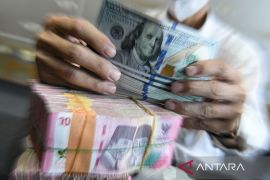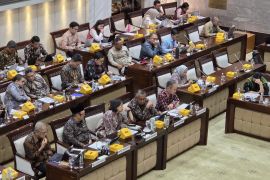The combination will eventually affect all sectors."Jakarta (ANTARA News) - Finance Minister Bambang P. S. Brodjonegoro expressed that he was not yet worried about the current depreciation of the countrys rupiah currency.
Brodjonegoro is of the view that the main cause of the depreciation was not the countrys economic fundamentals, but global economic pressures that have led financial market players to become irrational.
"The present condition is not rational in the sense that it does not reflect the economic fundamentals, but it has happened due to the negative market sentiment," he pointed out.
He noted that the rupiah depreciation also has the potential to trigger a currency war following the devaluation of the Chinese yuan and Vietnamese dong.
"It is difficult for the rupiah to appreciate as other currencies are also depreciating," he remarked.
The minister admitted that the rupiah had been undervalued, but the situation is still under control as the government and Bank Indonesia have continued to work to maintain the currency to ensure that it does not fluctuate too much against the US dollar.
"If we just look at the fundamental conditions, it is indeed already undervalued to a significant extent, and so, it must be strengthened," he stated.
Bambang remarked that under the current global pressure, which continues to increase, the rupiah value indeed must not be allowed to strengthen significantly as otherwise; it would be contradictory to the real condition.
"If the rupiah is strengthened and appreciates against all currencies, our competitiveness would be affected," he stated.
The finance minister pointed out that market traders are currently worried about the Chinese action, the drop in the global crude price, and the Feds plan to adjust its interest rate, which is anticipated in September.
The external pressures have indirectly weakened the rupiah exchange rate against the US dollar and the performance of the countrys stock exchange index.
"The combination will eventually affect all sectors. When the share prices fall in the United States, all stock exchanges will be affected. It is irrational for the world to consider that there is no way out to immediately restore the economic condition," he noted.
Minister Bambang stated that various efforts had been taken to anticipate capital outflows from the Indonesian share market due to external pressures, including optimizing the auction of state securities.
The Jakarta Stock Exchange index declined 172.22 points, or 3.97 percent, to end the day at 4,163.72 as compared to Fridays close of 4,335.95.
Meanwhile, during interbank transactions, the rupiah was traded down 47 points to Rp13,988 compared to its previous position at Rp13,941 per US dollar.
Bank Indonesia, the central bank, has decided to implement three strategies in order to maintain the stability in the rupiah exchange rate in the short term in the midst of the current global economic conditions and uncertainties.
"To maintain the stability of the rupiah, we have optimized monetary operations in the rupiah and foreign currency money markets," Juda Agung, the head of the central banks Monetary and Economic Police Department, stated.
The three strategies are strengthening the management of the rupiahs liquidity in the money market, the management of foreign currency demand and supply, and the availability of foreign currency reserves.
In terms of operations, the three strategies are being implemented through seven policies.
The policies cover intervention in the foreign currency market, the purchase of state securities in the secondary market, changing the mechanism of Bank Indonesia Deposit Certificate (SDBI) auction, issuing six-month SDBI and re-issuing nine-month and 12-month Bank Indonesia Certificates (SBIs), and adjusting the frequency of foreign exchange swap auctions from twice a week to once a week.
The other policies are lowering the limit of foreign currency purchase using underlying documents as proof from US$100 thousand to US$25 thousand per customer per month and obligating the use of tax-file number (NPWP) and coordination between the government and other central banks to strengthen foreign currency reserves.
The Indonesia Stock Exchange (BEI) admitted that it is coordinating with the Finance Service Authorities (OJK) in connection with the drop of the share price index in the past few days.
"The BEI is coordinating with the OJK with regard to the drop of the IHSG index and to discuss measures needed in line with the existing regulations," BEI Director Samsul Hidayat stated.
He stated that so far, the BEI continued to monitor the movement of the domestic share market through a crisis management protocol, among others.
"The BEI has indicators and stages that could be used when the market is fluctuating," he said.
Hidayat remarked that stimulus regulation in the capital market, produced by the OJK that allows issuers and public companies to conduct buybacks, is expected to be able to prevent a further drop in the index.
The OJK has produced a Circular Number 22.SEOJK,04/2015 to allow issuers or public companies to buy back their shares without having to seek an agreement in a shareholders meeting.
"The circular is issued to provide a stimulus and reduce the significant impact of market fluctuations due to external influence and pressures on the market," Nurhaida, the executive head of OJKs capital market supervision, noted.
She noted that issuers or public companies that implement the OJKs circular still have a provision to meet wherein the total buyback must not exceed 20 percent of the paid-up capital, including treasure stocks, and minimal shares in circulation must be 7.5 percent of the paid-up capital.
(Uu.H-YH/INE/KR-BSR/A014)
Editor: Priyambodo RH
Copyright © ANTARA 2015












